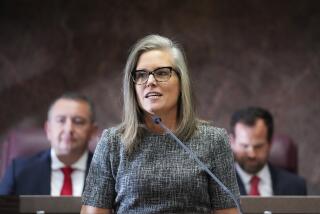More Americans Support School Choice, Survey Finds
- Share via
WASHINGTON — The American public by a slight margin now favors using public money to pay at least part of the cost of sending children to private or religious schools, according to a national poll released this week.
At the same time, a large majority says that the most crucial reforms in education involve strengthening existing public schools.
The Gallup organization, which annually surveys the public’s attitudes toward education, has found growing support over the last five years for the notion of school choice.
This year, by a margin of 51% to 47%, 1,103 respondents said they favored their state using government money to pay tuition to allow “parents to send their school-age children to any public, private or church-related school they choose.” In 1994, when this question was first asked, those surveyed opposed the idea 54% to 45%.
Parents with children in public schools supported the choice option 60% to 38%. Five years ago, parents in that category opposed tuition aid for private schools 51% to 48%. The idea of giving parents tax money to send their children to private schools found its strongest support among nonwhites, urban parents and those in the West, the pollsters said.
The survey results come amid legal battles in at least seven states over whether public money can or should be used to pay for religious schooling.
Lawyers for the Institute for Justice, a libertarian-oriented legal group in Washington, have been leading the campaign in favor of parental options as a way to shake up and reform education.
“The key is competition and choice,” said the Institute’s Clint Bolick, who has defended low-income parents in Milwaukee and Cleveland who have relied on public money to send their children to parochial schools. “The public schools will have to offer a quality program to parents if they want to compete.”
Last year, the U.S. Supreme Court rejected challenges to Wisconsin’s use of public funds for school vouchers in Milwaukee. But on Tuesday, a federal judge in Cleveland halted a similar program there on the day before schools were to open.
Bolick called the judge’s decision “astounding” and predicted that it would be overturned by a higher court.
Leaders of teachers’ unions have opposed the voucher concept, and they, too, found much to like in the latest opinion survey.
“I feel very optimistic about these results. They found overwhelming support for public education across this country,” said Sandra Feldman, president of the American Federation of Teachers. “A huge majority want us to focus on improving the public schools.”
She noted that, when asked whether policy-makers should focus on reforming the public school system or on creating alternatives to it, respondents by a more than 2-1 ratio said that improving the public schools should come first.
Moreover, most of those surveyed said they were impressed with the public schools in their community--and especially with their child’s own school. Two-thirds of those with children in public schools gave their schools an “A” or “B” grade, a slight uptick from recent years.
The survey was funded by Phi Delta Kappa, a professional association of educators based in Bloomington, Ind.
The court battles over school choice turn on whether the 1st Amendment allows public funds to directly subsidize religious schools.
During the 1970s, the Supreme Court insisted on strict separation of church and state, and the justices struck down several state laws that gave parents tax money to send their children to parochial schools.
Over the last decade, however, the more conservative court has shifted direction and allowed tax money to flow to church-related groups, provided the government does not endorse or promote a particular religion.
But the justices have not ruled squarely on whether states may use tax money to send children to parochial schools.
In Tuesday’s decision, the judge in Cleveland cited a 1973 high court ruling that struck down a New York state law that reimbursed parents who paid tuition to parochial schools. “Nyquist [the 1973 decision] has not been overruled,” said U.S. District Judge Solomon Oliver Jr. in halting Ohio’s aid program.
But Bolick, the school choice advocate, predicted that the 1973 decision will be overruled by the Supreme Court when and if the issue comes before the justices.
Besides Ohio, six other states--Maine, Vermont, Florida, Arizona, Illinois and Pennsylvania--have laws that either give public aid to some parochial schools or reimburse parents for private-school children.
“I’m confident any of these programs will be upheld by the [Supreme] Court,” Bolick predicted.
More to Read
Sign up for Essential California
The most important California stories and recommendations in your inbox every morning.
You may occasionally receive promotional content from the Los Angeles Times.











